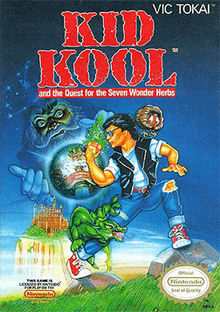Kid Kool
| Kid Kool | |
|---|---|
 Cover art Illustration by Lawrence Fletcher | |
| Developer(s) | Vic Tokai |
| Publisher(s) | Vic Tokai |
| Director(s) | Toshihisa Hasegawa |
| Programmer(s) | Tomohiko Kawamura |
| Artist(s) | Mayumi Sano |
| Composer(s) | Michiharu Hasuya |
| Platform(s) | Nintendo Entertainment System |
| Release date(s) | |
| Genre(s) | Platform game |
| Mode(s) | Single-player |
Kid Kool and the Quest for the Seven Wonder Herbs, known in Japan as Kakefu Kun no Jump Tengoku: Speed Jigoku (Japanese: カケフくんのジャンプ天国 スピード地獄 Hepburn: Kakefu Kun no Janpu Tengoku: Supīdo Jigoku, lit. "Kakefu's Jump Heaven: Speed Hell"), is a video game released for the Nintendo Entertainment System in 1988 by Vic Tokai. The game's main character is based on Kenji Sagara (相良 健治 Sagara Kenji), a popular Japanese child actor who was extremely famous in the 1980s.[1] Cover art illustrated by Lawrence Fletcher
Kid Kool is also one of the games featured in the Japanese Show GameCenter CX.
Summary

Kid Kool is a platform game akin to the Mario series. There is also a small red creature, "Wicky", that the player can carry, which will eliminate enemies when thrown.
The main character is on a quest to obtain seven herbs needed to help cure a king from an illness. The game will gradually progress from "day" to "night" modes as a timer counts down, with each cycle taking one hour in play time. There are multiple endings to the game, with the ending gained based on the time taken to complete the game. These range from the king having died if the player takes more than three hours, to being given four other rewards, starting with a bag of money for the fourth best ending, a bag of gold and a high position in the kingdom for the third ending, a chest of gems and the princess for the second ending, and finally a chest of gems, the princess, and the promise to rule the kingdom for the best ending.
The Vic Tokai game DecapAttack (Magical Hat no Buttobi Tābo! Daibōken in Japan) and Sega's Psycho Fox are part of the same family of games, sharing various control and design similarities.
References
- ↑ GameCenter CX Episode 91, Fuji TV
External links
- Kid Kool and the Quest for the Seven Wonder Herbs at GameFAQs
- Kid Kool and the Quest for the Seven Wonder Herbs at MobyGames